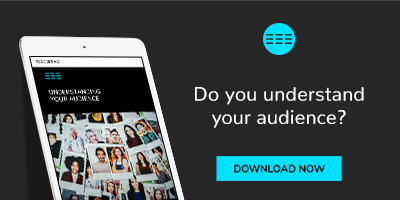Digital consumer behaviour is one of the most important metrics that any modern marketer can measure—but we’ve noticed that people are often getting overwhelmed by the sheer number of tools and metrics out there. After all, everyone claims their method (and their method alone) is groundbreaking.
This is what you really need to know, and why you should care:
What is digital behaviour?
Digital consumer behaviour, in terms of marketing research, essentially boils down to anything that a person does online. What devices they use, the sites they visit, the ads they engage with, the pages they navigate to, when they leave and how, and so on. If a customer clicks on something, it is recorded—and sometimes even when they don't click on something.

Related content: Digital disruption: how to excel in digital customer experiences
How is it measured?
There are a number of different ways that digital consumer behaviour is recorded, but easily the most common is through cookies. These are small units of code that exist within the software written to create the page that the consumer is visiting.
These cookies come in a wide variety of 'flavours', but all work in much the same way. They allow you to first-party data (which is collected from your website, digital campaigns, app users, etc) and third-party data (data points gathered from across the web) so you can understand the type of content that your audience engages with online. This allows you to build and segment unique audiences, so you can gain the right insights to understand what larger groups they may be a part of—and how likely you are to find them with your current content.
Cookies are certainly not the only way to track digital consumer behaviour, however. It can also be tracked through session IDs, caches, social information and some new technologies that can link users even when they are outside of a single session.
Related content: 3 ways to use your market segmentation strategy to be more competitive
Why should you care about it?
There’s one simple reason why digital behaviour matters: data. Unbiased, unbridled, unbelievably large levels of accurate consumer data.
Consider the following: our partners at Lotame tell us that there are over 12 million digital devices tagged in New Zealand. That’s almost three for every single man, woman and child in the country. A 2021 research report has also found that New Zealanders spend an average 6 hrs 39 mins on the internet everyday. And with the growth of eCommerce, some of those hours are being taken up with online shopping. According to Statista, online retail spending accounted for around 16 per cent of total retail spending in New Zealand in April 2023, while it's predicted that by 2026, 83 per cent of Kiwis will be shopping online.
The world has changed. Humans are now digital creatures, and traditional market research methods have a hard time capturing the kinds of behaviour you need to know. Once upon a time, you could simply watch consumers walk around a physical store, record what they bought and when, and that might be enough. But with more and more people heading to the online world for their purchases, we need to be able to track these online behaviours to get the data we need to improve their experience—and our bottom lines.
Such a huge amount of data shouldn’t go to waste, and the digital nature of these new market research methods make it easy to capture, manage and analyse this information—assuming you have the right analytical team on board to help you make sense of the data. As a result, digital consumer behaviour can be used to uncover important customer segments. Want to be agile? Then digital marketing behaviour analysis should be a primary part of your toolbox.
Related content: Understanding your Audience [EBOOK]
Summary
Digital consumer behaviour: with people spending hours every day either actively or passively connected to the online world, it’s no wonder so many consider it a significant part of the future of marketing. It holds a wealth of information that, even a decade ago, marketers couldn’t even begin to dream of. Meanwhile, its technological position makes it easier than ever to actually implement.
Want deeper, broader insights? Sometimes, all it takes is a couple of cookies.
Delivering effective marketing comes down to one thing—excellent market segmentation. Learn how to target your key customers and improve your marketing effectiveness with our free guide!
